| Listing 1 - 10 of 57 | << page >> |
Sort by
|
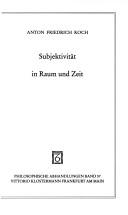
ISBN: 3465022548 Year: 1990 Volume: vol 57 Publisher: Frankfurt am Main Klostermann
Abstract | Keywords | Export | Availability | Bookmark
 Loading...
Loading...Choose an application
- Reference Manager
- EndNote
- RefWorks (Direct export to RefWorks)
Philosophical anthropology --- Subjectiviteit --- Subjectivity --- Subjectivité
Book
ISBN: 9782718604015 2718604018 Year: 2005 Publisher: Paris : Galilée,
Abstract | Keywords | Export | Availability | Bookmark
 Loading...
Loading...Choose an application
- Reference Manager
- EndNote
- RefWorks (Direct export to RefWorks)
Dans les brumes et les miasmes qui obscurcissent notre fin de millénaire, la question de la subjectivité revient désormais comme un leitmotiv. Pas plus que l'air et l'eau, elle n'est pas une donnée naturelle. Comment la produire, la capter, l'enrichir, la réinventer en permanence de façon à la rendre compatible avec des Univers de valeur mutants? Comment travailler à sa libération, c'est à dire à sa re-singularisation? La psychanalyse, l'analyse institutionelle, le film, la littérature, la poésie, des pédagogies innovantes, des urbanismes et des architectures créateurs... toutes les disciplines auront à conjoindre leur créativité pour conjurer les épreuves de la barbarie, d'implosion mentale, de spasme chaosmique, qui se profilent à l'horizon et pour les transformer en richesses et en jouissances imprévisibles, dont les promesses, au demeurant, sont tout aussi tangibles. (Quatrième de couverture)
Psychanalyse --- Psychoanalysis --- Psychologie. --- Subjectiviteit. --- Subjectivity. --- Subjectivité. --- Subjektivität. --- Philosophie. --- Philosophy. --- Inconscient --- Philosophie --- Sémiologie --- Subjectivity --- Subjectivité --- Philosophy
Dissertation
Abstract | Keywords | Export | Availability | Bookmark
 Loading...
Loading...Choose an application
- Reference Manager
- EndNote
- RefWorks (Direct export to RefWorks)
Doelstelling: De voornaamste doelstelling van dit onderzoek bestaat erin om na te gaan of het mogelijk is om Nederlandstalige online consumentenbeoordelingen automatisch te classificeren volgens subjectiviteit. Deze subjectiviteit wordt uitgedrukt in 5 klassen: zeer negatief, negatief, neutraal, positief en zeer positief. De consumentenbeoordelingen zijn verdeeld over verschillende domeinen waarvoor de consument het vaakst het internet raadpleegt alvorens tot aankoop over te gaan. Het uiteindelijke doel is het systeem toe te passen op nieuwe, ongeziene consumentenbeoordelingen en de accuraatheid ervan te meten. Anderzijds wordt de toepasbaarheid gemeten van domeinspecifieke lexicons naar andere domeinen. Middelen of methode: De gebruikte methode is lexicongebaseerde automatische sentiment mining waarbij op zoek gegaan wordt naar de subjectiviteit van taaluitingen, in dit geval consumentenbeoordelingen. Als basis voor het onderzoek werd een corpus van 500 Nederlandstalige reviews samengesteld, verdeeld over 5 domeinen: elektronica, films, auto's, hotels en cd's. Deze reviews zijn handmatig beoordeeld op hun subjectiviteit en verdeeld over 5 klassen. Tevens werden alle subjectieve woorden in de beoordelingen geannoteerd en ingedeeld in 4 klassen: zeer negatieve, negatieve, positieve en zeer positieve woorden. Deze woorden zijn per domein opgelijst in een sentimentlexicon. Daarnaast werd ook gebruik gemaakt van een bestaand sentimentlexicon voor het Nederlands, opgesteld door Jijkoun. Aan de hand van een zelfgemaakt programma, het samengestelde corpus en de lexicons zijn de 5 domeinen geanalyseerd op hun accuraatheid, precisie, recall en F-score. Resultaten: Voor dit onderzoek werden verschillende experimenten uitgevoerd met alle mogelijke combinaties van beschikbare hulpmiddelen. Over het algemeen zijn de verkregen resultaten unaniem: alleen een lexicongebaseerd systeem voor consumentenbeoordelingen volstaat niet om zeer gedetailleerde resultaten te generen. De beste resultaten zijn echter wel verkregen bij zeer uitgebreide lexicons die domeinafhankelijk zijn. Op basis van onze experimentele resultaten concluderen we bijgevolg dat er vooral twee factoren een grote rol spelen in het slagen van lexicongebaseerde systemen: de grootte van het lexicon en de domeinafhankelijkheid van een lexicon.
Consumentenbeoordeling. --- Domeinadaptatie. --- Domeinafhankelijk lexicon. --- Lexicon gebaseerd. --- Nederlandstalig. --- Online meningen. --- Opinion mining. --- Review. --- Sentimentanalyse. --- Subjectiviteit. --- Taaltechnologische studie.
Dissertation
Abstract | Keywords | Export | Availability | Bookmark
 Loading...
Loading...Choose an application
- Reference Manager
- EndNote
- RefWorks (Direct export to RefWorks)
Doelstelling: In het kader van een lopend onderzoeksproject onderzoekt deze scriptie of het al dan niet mogelijk is om op basis van bestaande annotatierichtlijnen subjectiviteit te annoteren in Nederlandstalige blogteksten. Die annotaties moeten in een latere fase aan de basis liggen van een systeem dat automatisch suïcidale berichten detecteert op sociale netwerksites zoals Netlog. Middelen of methode: Om te bepalen of de annotatierichtlijnen ook toepasbaar zijn op de Nederlandstalige blogteksten worden twee kleine corpora geannoteerd door twee onafhankelijke annotatoren en wordt de inter-annnotator agreement berekend. Resultaten: De goede resultaten van de inter-annotator agreement tonen aan dat de annotatierichtlijnen toepasbaar zijn op Nederlandstalige blogteksten. Een automatisch systeem kan ontwikkeld worden aan de hand van deze annotaties.
Annotaties. --- Automatische sentimentdetectie. --- Blogteksten. --- Corpusgebaseerde studie. --- Features. --- Inter-annotator agreement. --- Polariteit. --- Sociale netwerksites. --- Subjectiviteit. --- Zelfmoord.
Book
Year: 1980 Publisher: Paris : Colin,
Abstract | Keywords | Export | Availability | Bookmark
 Loading...
Loading...Choose an application
- Reference Manager
- EndNote
- RefWorks (Direct export to RefWorks)
Discourse analysis. --- Enonciation (linguistique). --- Grammar, Comparative and general. --- Linguistique. --- Pragmatics. --- Semantics. --- Sprache. --- Subjectiviteit. --- Subjectivity. --- Subjectivité. --- Subjektivität. --- Taalhandelingen.
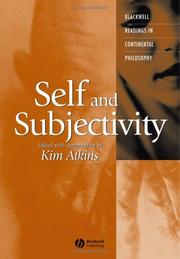
ISBN: 1405112042 9781405112048 1405112050 Year: 2005 Volume: 8 Publisher: Oxford : Blackwell,
Abstract | Keywords | Export | Availability | Bookmark
 Loading...
Loading...Choose an application
- Reference Manager
- EndNote
- RefWorks (Direct export to RefWorks)
Philosophical anthropology --- Cogito --- Ik (Filosofie) --- Moi (Philosophie) --- Self (Philosophy) --- Subjectiviteit --- Subjectivity --- Subjectivité --- Subjectivity. --- History. --- Self (Philosophy). --- History --- Subjectivism --- Knowledge, Theory of --- Relativity --- Philosophy
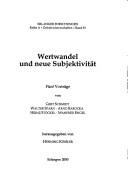
ISBN: 3930357356 9783930357352 Year: 2000 Volume: 91 Publisher: Berlin ; München : Universitätsbibliothek Erlangen-Nürnberg,
Abstract | Keywords | Export | Availability | Bookmark
 Loading...
Loading...Choose an application
- Reference Manager
- EndNote
- RefWorks (Direct export to RefWorks)
Ethics --- Ethiek --- Ethique --- Subjectiviteit --- Subjectivity --- Subjectivité --- Valeurs (Philosophie) --- Values --- Waarden (Filosofie) --- Values. --- Subjectivity. --- Axiology --- Worth --- Aesthetics --- Knowledge, Theory of --- Metaphysics --- Psychology --- Subjectivism --- Relativity
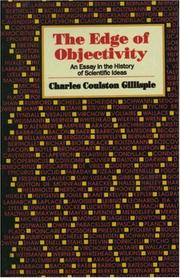
ISBN: 0691023506 9780691023502 0691079528 9780691079523 Year: 1973 Publisher: Princeton : Princeton University Press,
Abstract | Keywords | Export | Availability | Bookmark
 Loading...
Loading...Choose an application
- Reference Manager
- EndNote
- RefWorks (Direct export to RefWorks)
Science --- Sciences --- History --- Philosophy --- Histoire --- Philosophie --- Pure sciences. Natural sciences (general) --- Philosophy of science --- History. --- Philosophy. --- 165.42 --- 50 --- 50 Generalities about the pure sciences --- Generalities about the pure sciences --- 165.42 Kennis: omvang van de geldigheid; subjectiviteit; objectiviteit --- Kennis: omvang van de geldigheid; subjectiviteit; objectiviteit
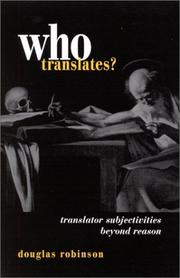
ISBN: 0791448649 0791448630 9780791448632 9780791448649 079149117X 9780791491171 Year: 2001 Publisher: New York, NY : State University of New York Press,
Abstract | Keywords | Export | Availability | Bookmark
 Loading...
Loading...Choose an application
- Reference Manager
- EndNote
- RefWorks (Direct export to RefWorks)
Translators have long claimed that their job is to "step aside and let the source author speak through them." In Who Translates? Douglas Robinson uses this adage to set up a series of "postrationalist" perspectives on translation, all based on the recognition that translation has always been thought of in terms of the translator's surrender to forces beyond his or her rational control. Exploring this theme, Robinson examines Plato's Ion, Philo Judaeus and Augustine on the Septuagint, Paul on inspired interpreters, Joseph Smith on the Book of Mormon, and Schleiermacher, Marx, and Heidegger on translation. He traces the imaginative and historical linkages between twentieth-century conceptions of ideology and ancient conceptions of spirit-channeling, and the performative inversion of power relations by which the "channel" (or translator) comes to wield the source author as his or her tool. And he argues throughout for a postrationalist conception of translation based not on the translator's rational control of words and meanings but rather on a flowing through the translator of voices and textualities.
82.03 --- Vertalen. Literaire vertaling --- Vertalen en subjectiviteit --- Subjectivity --- Translating and interpreting --- Vertalen --- Vertalen en filosofie --- psychologie --- 82.03 Vertalen. Literaire vertaling --- Vertalen en subjectiviteit. --- Subjectivity. --- Translating and interpreting. --- Vertalen en filosofie. --- psychologie. --- Interpretation and translation --- Interpreting and translating --- Language and languages --- Literature --- Translation and interpretation --- Translators --- Subjectivism --- Knowledge, Theory of --- Relativity --- Translating --- Philology & Linguistics --- Languages & Literatures --- Traduction. --- Subjectivité.
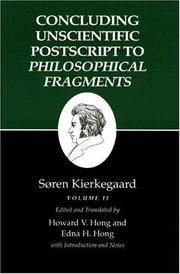
ISBN: 0691020817 0691073953 0691020825 9780691020815 9780691020822 9780691073958 9780691073958 0691020833 9780691020839 069107402X 1400847001 1299456421 1299454046 1400846994 Year: 1992 Volume: 12 Publisher: Princeton (N.J.): Princeton university press
Abstract | Keywords | Export | Availability | Bookmark
 Loading...
Loading...Choose an application
- Reference Manager
- EndNote
- RefWorks (Direct export to RefWorks)
In Philosophical Fragments the pseudonymous author Johannes Climacus explored the question: What is required in order to go beyond Socratic recollection of eternal ideas already possessed by the learner? Written as an afterword to this work, Concluding Unscientific Postscript is on one level a philosophical jest, yet on another it is Climacus's characterization of the subjective thinker's relation to the truth of Christianity. At once ironic, humorous, and polemical, this work takes on the "unscientific" form of a mimical-pathetical-dialectical compilation of ideas. Whereas the movement in the earlier pseudonymous writings is away from the aesthetic, the movement in Postscript is away from speculative thought. Kierkegaard intended Postscript to be his concluding work as an author. The subsequent "second authorship" after The Corsair Affair made Postscript the turning point in the entire authorship. Part One of the text volume examines the truth of Christianity as an objective issue, Part Two the subjective issue of what is involved for the individual in becoming a Christian, and the volume ends with an addendum in which Kierkegaard acknowledges and explains his relation to the pseudonymous authors and their writings. The second volume contains the scholarly apparatus, including a key to references and selected entries from Kierkegaard's journals and papers.
Christian apologetics --- Christian dogmatics --- Apologetics --- Christianity --- -Christianity --- Religions --- Church history --- Apologetics, Missionary --- Christian evidences --- Evidences, Christian --- Evidences of Christianity --- Fundamental theology --- Polemics (Theology) --- Theology, Fundamental --- Religious thought --- Theology --- Philosophy --- Evidences --- Apologetics. --- Subjectiviteit. --- Philosophy. --- -Philosophy --- -Apologetics --- History
| Listing 1 - 10 of 57 | << page >> |
Sort by
|

 Search
Search Feedback
Feedback About
About Help
Help News
News